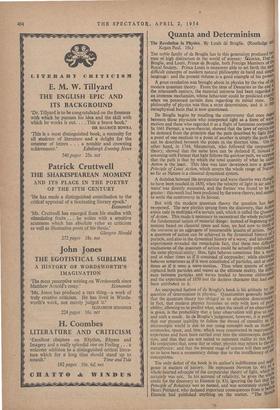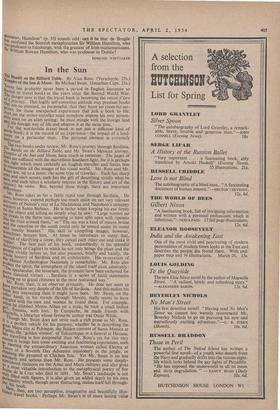Quanta and Determinism
The Revolution in Physics. By Louis d' Broglie. (Routledge Kegan Paul. 18s.) THE noble family of de Broglie has in this generation produced t\ men of high distinction in the world of science: gilaurice, Due Broglie, and Louis, Prince de Broglie, both Foreign Members of 111_,t Royal Society. Prince Louis is moreover able to set forth the ine,! difficult concepts of modern natural philosophy in lucid and simPl` language: and the present volume is a good example of his power'' A great revolution was brought about in physics by the rise of 1, modern quantum theory. From the time of Descartes to the end the nineteenth century, the material universe had been regarded an immense mechanism, whose behaviour could be predicted exaet,e when we possessed certain data regarding its initial state. '1,T, philosophy of physics was thus a strict determinism, and it is thP metaphysical basis that is now questioned. De Broglie begins by recalling the controversy that once raged between those physicists who interpreted light as a form of watt' motion and those who regarded it as a flight of luminous corpuscle' In 1661 Fermat, a wave-theorist, showed that the laws of optics C be deduced from the principle that the path described by light fill a point of one medium to a point of another is simply the path th can be described between the points in the shortest time. On the other hand, in 1744, Maupertuis, who followed the corpuscidat theory, showed that the same laws can be deduced if, instead °t assuming with Fermat that light follows the quickewt path, we suPP1 that the path is that by which the total quantity of what he called Action is the least. This idea was later developed, into a genera) Principle of Least Action, which covers the whole range of Natural so far as Nature is a classical dynamical system. tl:?raeter, Hamilton" (p. 35) sounds odd: can it be that de Broglie !s confused the Scottish metaphysician Sir William Hamilton, who was professor in Edinburgh, with the greatest of Irish mathematicians, Su William Rowan Hamilton, who was professor in Dublin?
EDMUND WHITTAKER



















































 Previous page
Previous page